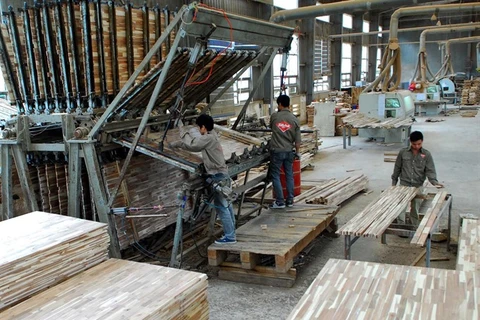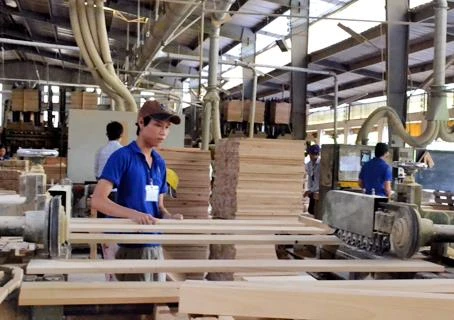Hanoi (VNA) - The price of several kinds of lumber in Vietnam had gone up due to scarcity created by unexpected Chinese purchases, creating pressure on the domestic wood business and Vietnam’s wood industry.
As reported by local wood processing and manufacturing companies, many Chinese companies crossed the border into Vietnam to buy a large quantity of rubber wood and acacia wood in central and southern Vietnamese provinces, resulting in a rise of 10 to 20 percent of wood prices, according to Huynh Quang Thanh, Chairman of the Binh Duong Furniture Association.
Local businesses have been under great pressure by the price hike and the lack of supply, resulting in fierce competition and increased output prices, reported baotintuc.vn.
The lack of raw lumber could result in a halt in the Vietnamese wood industry, and the Vietnam Timber and Forest Product Association (VIFORES) would submit a petition at the end of December 2016 to the government in hope of a definite solution, said Nguyen Ton Quyen, Vice Chairman of VIFORES.
At present, 90 percent of rubber lumber in Tay Nguyen had been purchased by Chinese companies. These businesses placed sawmills within the region, hiring locals to collect the lumber and paying at site or beforehand with cash. Since September 2016, prices for rubber wood had gone up 20 to 30 percent in these parts, said Do Xuan Lap, Chairman of Binh Dinh Timber Association.
Administrative agencies and wood associations would aid the government in determining a suitable solution in accordance with world legislations and conducts.
Regarding the future of the matter, To Xuan Phuc, Forest Trends’ senior policy analyst, commented that with Vietnam’s geographical advantage, cheap labour and a developed network of sea ports, the country could become a major attraction for Chinese businesses. Investment within the wood industry from China to Vietnam could be increasing at a fast pace in near future.
The reason behind the sudden spike in demand for Vietnamese lumber from Chinese buyers lies in a 2015 ban by the Chinese government to cease all extraction of natural wood for commercial purposes by 2017.
China will effectively close down natural forests in 14 provinces within the country starting from 2017, which would result in a shortage of 49.94 million cubic metres of wood for Chinese wood processing and manufacturing for both domestic consumption and export purposes.
The ban had been implemented since 2015 in three phases. The first phase included stopping all commercial lumbering at major natural forest, whereas the second phase, beginning 2016, ceased all wood extraction at natural forests managed by afforestation yards and the third phase in 2017 would stop all natural wood lumbering in China.
There had been several other concerns in the matter, such as the level of tax on lumber of different thickness and a much needed policy to encourage locals to help with forestry.
In particular, the current level of tax for lumber thicker than 30 millimetre would be 20 per cent, while those thinner than said number would only receive a tax of 10 per cent. This had lead to frauds and would need a common tax level of 20 per cent to prevent commercial malpractice and deficit of raw wood material, said Thanh.
In the first three quarters of 2016, total export value of wood from Vietnam to China had reached 965.8 million USD, nearly 75 per cent compared to the same period in 2015.-VNA
VNA

























